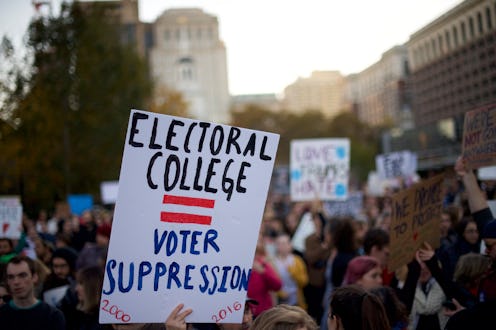News
Why Faithless Electors Won't Swing This Election
Even though Hillary Clinton won the popular vote, she's not going to be the next president of the United States. That title, as we all know too well, will be going to Donald J. Trump, who pulled off an incredible upset on Nov. 8, securing at least 290 electoral votes to Clinton's 232, according to the Associated Press. And while voters have already cast their ballots in all 50 states, there's still one last-ditch effort to elect Clinton to which some are clinging: an Electoral College shake-up. When the electors meets Dec. 19, they could, in theory, ignore the way their states voted, and cast their votes for someone else. Electors who do this are called "faithless electors," and they could change the election outcome, though it's incredibly unlikely that they'll do so.
First, a bit of background: When Americans went to their polling places on Nov. 8, they weren't actually voting directly for president. Instead, they were casting votes that would determine the partisan makeup of that state's group of electors — which is calculated based on the number of representatives each state has in Congress. Those electors, who are selected before the election at each major party's state convention, will meet at their state's capitol on Dec. 19 to formally cast their votes for president and vice president. Those ballots will then be sent to Congressional leaders and the secretary of state, who will confirm and report the results, signaling the formal end of the election, as affirmed by the Electoral College.
Historically, the vast majority of electors have voted in accordance with the results of their state. Roughly half of U.S. states have laws requiring electors to cast their ballots for the candidate who won that state, but there has never been an instance of an elector being prosecuted for voting differently than their state did. It's that reality that has helped fuel the popularity of a Change.org petition that asks electors to name Clinton president instead of Trump. At press time, that petition has more than 4.3 million signatures.
Vox reports that throughout the nation's history, there have been only a handful of faithless electors, and just nine in the past 80 years. Some of those electors changed their votes because the candidate who won their state died before the Electoral College met. Others had differing reasons, but faithless electors have never reversed the outcome of an election.
There are numerous reasons that's the case, as Vox's Andrew Prokop breaks down. But the biggest reason is that electors are chosen by their state-level party conventions, meaning electors are usually partisan insiders who can be trusted to remain "loyal" to their particular party. And given how the electoral vote came down in the 2016 election, an unprecedented number of electors would have to become "faithless" to change the results.
While there's been ongoing chatter on social media about the potential for a democratic coup led by faithless electors, I couldn't find any reputable reports identifying specific electors who had agreed to change their vote. That means, in all likelihood, those taking to the streets to proclaim Trump is #NotMyPresident are going to have to keep marching for the next four years to disrupt each of the the incoming administration's likely attacks on women's health, and rights for people of color, immigrants, and LGBT Americans.
